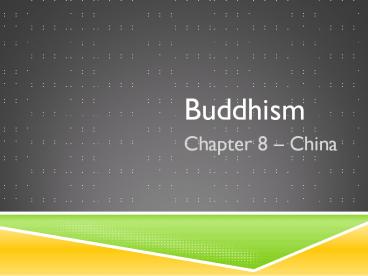Buddhism - PowerPoint PPT Presentation
1 / 18
Title:
Buddhism
Description:
... teaching of the Buddha Skinny Buddha vs. Fat Buddha Why Buddhism Spread IN China Traders and Missionaries from India brought ... schools and providing food and ... – PowerPoint PPT presentation
Number of Views:248
Avg rating:3.0/5.0
Title: Buddhism
1
Buddhism
- Chapter 8 China
2
Introduction
- Buddhism is a religion to about 300 million
people around the world - budhi to awaken
- founder Siddhartha Gotama The Buddha - the
enlightened one - _at_ 2500 years ago
- India was home to its founding
3
- Some say Buddhism goes beyond being a religion
- Is more of a philosophy (way of life)
- Buddhist path is summed up as
- 1) to lead a moral life
- 2) to be mindful and aware of thoughts and
actions, and - 3) to develop wisdom and understanding
4
Buddha (Siddhartha Gotama)
- born into a royal family in Nepal
- at 29 came to believe that wealth and luxury did
not guarantee happiness - he explored the different teaching religions and
philosophies of the day to find the key to human
happiness
5
- for 6 years he studied and meditated and finally
came upon what he called the middle path and
he himself was enlightened - After his enlightenment, the Buddha spent the
rest of his life teaching the principles of
Buddhism (known as Dhamma, or Truth) - The Buddha died at the age of 80
6
Teachings of Buddhism
- Four Noble Truths
- 1) life is suffering
- 2) suffering is caused by craving and
aversion - 3) suffering can be overcome and happiness can
be attained - 4) the Noble 8-fold path leads to the end of
suffering
7
Noble 8 fold Path
- Wisdom
- - right view
- - right intention
- Ethical Conduct
- - right speech
- - right action
- - right livelihood
- - right effort
- Concentration
- - right effort
- - right mindfulness
- - right concentration
8
The Five Precepts
- Not to take the life of any living thing
- not take anything not freely given
- to abstain from sexual misconduct and sensual
overindulgence - to refrain from untrue speech
- to avoid intoxication (losing mindfulness)
9
Karma
- is the law that every cause has an effect, (our
actions have results) - Karma underlines the importance of all
individuals being responsible for their past and
present actions
10
- How can we test the karmic effect of our actions?
The answer is summed up by looking at - (1) the intention behind the action,
- (2) effects of the action on oneself, and
- (3) the effects on others
11
Misc.
- Was Buddha a god?
- - no and he did not claim to be
- - He was a man who taught a path to
enlightenment from his own experience
12
2. Do Buddhists worship idols?
- They respect to the images of Buddha
- - not in worship
- - they do not ask for favors
- - a Buddha statue reminds them to strive to
develop peace and love within themselves - - in bowing to the statue they offer
gratitude for the teaching of the Buddha
13
Skinny Buddha vs. Fat Buddha
14
Why Buddhism Spread IN China
- Traders and Missionaries from India brought
Buddhism to China - It was a time in China of decline and despair as
civil war broke out - Many died
- Buddhism taught that people could escape
suffering by following the teachings of the Buddha
15
How Did the Tang Rulers view Buddhism ?
- The early Tang rulers did not practice Buddhism,
but they did not interfere with those who
followed it - They approved the building of temples and
shrines - The Buddhist monks and nuns helped local people
by running schools and providing food and
shelters
16
- Many people opposed the religion
- They thought the Buddhists had become too
wealthy with the donations they had used to build
their buildings - Some felt they weakened respect for family life,
due to the monks and nuns not being allowed to
marry - Tang officials feared the growing influence
being an enemy of Confucius
17
- Tang officials began to destroy many of the
Buddhist monasteries and temples - Buddhism never fully recovered from the attacks
in China - The Chinese Buddhist took their religion to
Korea - The Korean leaders approved it
- Then it was spread to Japan
Buddhism in Korea
18
(No Transcript)































